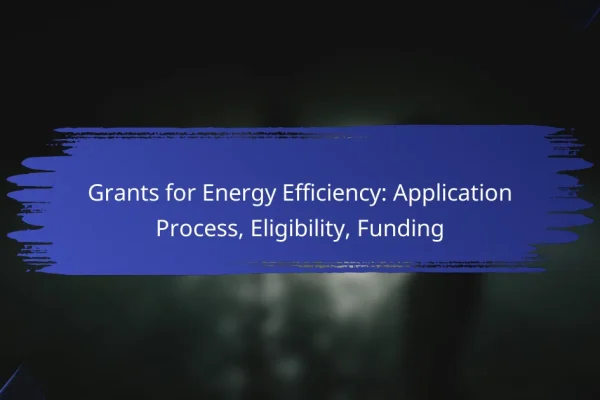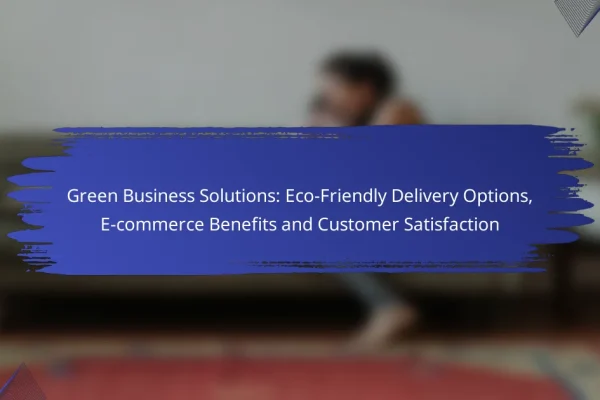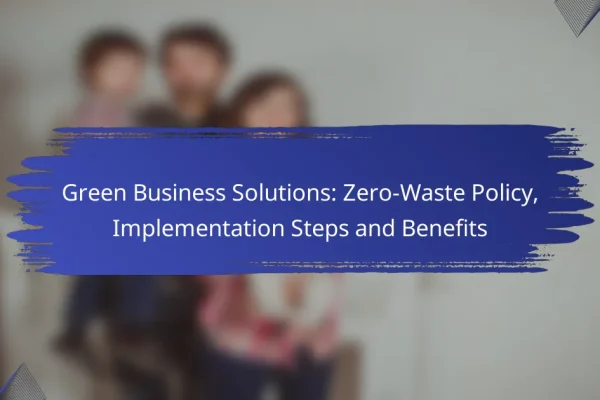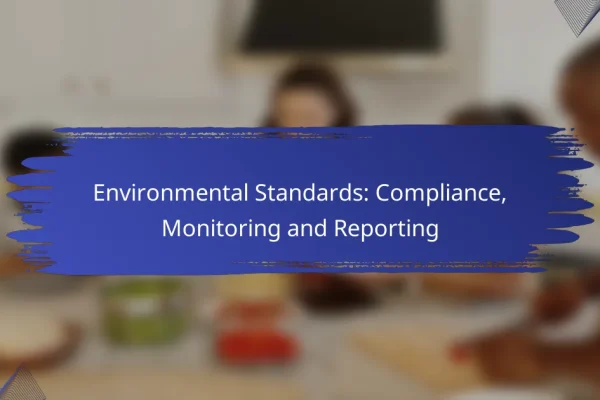
Sustainable Materials Transition: Strategies, Challenges and Best Outcomes
The transition to sustainable materials in manufacturing is essential for reducing environmental impact while ensuring…
Green business solutions are essential for companies aiming to minimize their environmental impact while improving operational efficiency. By adopting sustainable practices such as renewable energy use and waste reduction, businesses can not only save costs but also enhance their brand reputation and attract eco-conscious consumers. Integrating these eco-friendly strategies into everyday operations is key to fostering a more sustainable future.

The transition to sustainable materials in manufacturing is essential for reducing environmental impact while ensuring product quality and profitability. Effective strategies include adopting biodegradable plastics, implementing circular economy practices, and leveraging technology for material innovation. However, businesses face challenges such as high initial costs and supply chain limitations, making it crucial to address these issues…

Grants for energy efficiency are available in the United States to support projects in residential, commercial, and industrial sectors, helping to lower upfront costs and promote energy-saving technologies. The application process generally involves submitting an online form along with required documentation by specific deadlines. Eligibility criteria typically encompass homeowners, businesses, and nonprofit organizations, focusing on…

Eco-friendly packaging is essential for businesses looking to reduce their environmental impact while catering to consumer demand for sustainability. Selecting the right materials, considering lifecycle impacts, and understanding cost implications are critical factors in making informed packaging choices. Although initial costs may be higher, the long-term benefits can lead to significant savings and a positive…

Green business solutions in Los Angeles focus on reducing environmental impact while fostering community engagement and collaboration. By forming local partnerships, businesses can enhance their sustainability initiatives, leading to innovative solutions and increased visibility. These efforts not only promote a healthier environment but also yield significant benefits such as cost savings and improved brand reputation….

In today’s eco-conscious market, businesses are increasingly adopting green delivery solutions that minimize environmental impact while ensuring efficiency. By utilizing sustainable practices such as electric vehicles and reusable packaging, e-commerce companies can not only appeal to environmentally aware consumers but also enhance customer satisfaction and loyalty. Embracing these eco-friendly options contributes to long-term success and…

Adopting a zero-waste policy can significantly benefit businesses by reducing costs, enhancing brand reputation, and ensuring compliance with environmental regulations. This approach not only minimizes waste generation but also fosters employee engagement and supports broader sustainability initiatives. Implementing such a policy requires a strategic plan that emphasizes recycling, reuse, and collaboration with partners to achieve…

Environmental standards play a crucial role in guiding organizations toward sustainable practices while ensuring compliance with legal and regulatory frameworks. By implementing systematic approaches to monitoring and reporting, businesses can effectively minimize their environmental impact and maintain transparency in their operations. What are the key environmental standards for compliance? Key environmental standards for compliance include…

In today’s competitive landscape, green business solutions are becoming essential for companies aiming to enhance sustainability and efficiency. By leveraging technology tools that monitor environmental impact and streamline operations, businesses can significantly reduce waste and optimize resource usage. Startups, in particular, stand to benefit from adopting eco-friendly practices, gaining cost savings and improved brand reputation…

Understanding the differences between biodegradable and recyclable materials is essential for making informed choices about waste management and environmental impact. Biodegradable materials decompose naturally through microbial action, while recyclable materials can be processed into new products, conserving resources and reducing landfill waste. Choosing the right option depends on the specific application and the desired environmental…

Organic certification is a vital process for food businesses seeking to align with established organic standards, ensuring compliance through preparation, application, inspection, and ongoing adherence. To obtain certification, businesses must meet specific regulations, including the use of organic ingredients and maintaining thorough records. Achieving this certification not only builds consumer trust but also provides a…
The best green business solutions in the USA focus on reducing environmental impact while enhancing operational efficiency. Key strategies include renewable energy adoption, sustainable supply chain management, waste reduction, green certifications, and energy-efficient technologies.
Adopting renewable energy sources, such as solar, wind, and geothermal, helps businesses reduce their carbon footprint and energy costs. Many companies can benefit from federal and state incentives, making the transition more financially viable.
For instance, installing solar panels can lead to significant savings on electricity bills, with payback periods typically ranging from 5 to 10 years. Businesses should evaluate their energy needs and local resources to choose the most suitable renewable energy solution.
Sustainable supply chain management involves sourcing materials and products in an environmentally friendly manner. This includes selecting suppliers who prioritize sustainability and reducing transportation emissions by localizing supply chains.
Companies can implement practices such as using recycled materials, optimizing logistics, and collaborating with eco-conscious suppliers. Regular assessments of the supply chain can identify areas for improvement and ensure compliance with sustainability goals.
Implementing waste reduction strategies is essential for minimizing landfill contributions and conserving resources. Businesses can adopt practices like recycling, composting, and reducing single-use plastics to achieve these goals.
Conducting a waste audit can help identify the main sources of waste and inform targeted reduction strategies. Setting measurable goals, such as reducing waste by 20% over a year, can motivate employees and track progress effectively.
Obtaining green certifications can enhance a company's credibility and appeal to environmentally conscious consumers. Certifications like LEED for buildings or ISO 14001 for environmental management systems provide frameworks for sustainable practices.
Businesses should research relevant certifications in their industry and ensure they meet the necessary criteria. Achieving certification can also open up new market opportunities and improve overall operational efficiency.
Investing in energy-efficient technologies can significantly reduce energy consumption and costs. Options include LED lighting, smart thermostats, and energy-efficient appliances that consume less power while maintaining performance.
Conducting an energy audit can help identify areas where technology upgrades can yield the most savings. Businesses should consider the initial investment against long-term savings to make informed decisions about energy-efficient upgrades.
Businesses can implement sustainable practices by integrating eco-friendly strategies into their operations, reducing waste, and promoting resource efficiency. This involves assessing current practices, engaging employees, and setting clear sustainability targets.
Sustainability assessments help businesses identify their environmental impact and areas for improvement. This process typically involves evaluating energy use, waste management, and resource consumption.
To conduct an assessment, companies can use tools like carbon footprint calculators or sustainability reporting frameworks such as the Global Reporting Initiative (GRI). Regular assessments can guide decision-making and highlight progress over time.
Engaging employees is crucial for the success of sustainability initiatives. When staff members are involved, they are more likely to contribute ideas and adopt sustainable practices in their daily work.
Companies can foster engagement by creating sustainability committees, hosting workshops, or offering incentives for eco-friendly behaviors. Encouraging open communication about sustainability goals can also enhance team collaboration and commitment.
Setting measurable sustainability goals provides clear targets for businesses to strive towards. These goals should be specific, achievable, and aligned with the company's overall mission.
Examples of measurable goals include reducing energy consumption by a certain percentage within a year or achieving zero waste to landfill by a specific date. Regularly tracking progress against these goals helps maintain accountability and motivates continuous improvement.
Sustainable business practices offer numerous advantages, including cost savings, improved brand reputation, and the ability to attract eco-conscious consumers. By implementing these practices, businesses can enhance their operational efficiency while contributing positively to the environment.
Implementing sustainable practices often leads to significant cost savings through improved efficiency. For example, energy-efficient technologies can reduce utility bills by 20-30%, while waste reduction strategies can lower disposal costs. Businesses should regularly assess their resource usage to identify areas for potential savings.
Investing in renewable energy sources, such as solar or wind, can also provide long-term financial benefits. While the initial investment may be substantial, the reduction in energy costs over time can lead to a favorable return on investment.
Adopting sustainable business practices can significantly enhance a company's brand reputation. Consumers increasingly prefer brands that demonstrate environmental responsibility, which can lead to increased customer loyalty and positive word-of-mouth. Companies that communicate their sustainability efforts effectively can differentiate themselves in a crowded marketplace.
Engaging in community sustainability initiatives or obtaining certifications, such as ISO 14001, can further bolster a brand's image. These actions signal to consumers that the business is committed to making a positive impact, which can translate into increased sales and market share.
Eco-conscious consumers are actively seeking products and services from businesses that prioritize sustainability. By aligning offerings with these values, companies can tap into a growing market segment. Research indicates that a significant portion of consumers are willing to pay a premium for sustainable products, making this an attractive opportunity for businesses.
To effectively attract these consumers, businesses should highlight their sustainable practices in marketing materials and on their websites. Transparency about sourcing, production methods, and environmental impact can help build trust and encourage purchasing decisions among eco-conscious shoppers.
Adopting green solutions presents several challenges that businesses must navigate. Key obstacles include initial investment costs, regulatory compliance issues, and employee resistance to change.
The initial investment costs for green solutions can be significant, often deterring businesses from making the switch. Companies may need to invest in new technologies, equipment, or infrastructure to implement sustainable practices.
For example, transitioning to energy-efficient systems or renewable energy sources can require upfront expenditures that range from thousands to millions of dollars, depending on the scale of the operation. However, these costs can often be offset by long-term savings on energy bills and potential tax incentives.
Navigating regulatory compliance can be complex for businesses adopting green solutions. Different regions have varying environmental regulations that must be adhered to, which can complicate the implementation of sustainable practices.
For instance, companies in the European Union must comply with strict environmental directives, while those in the United States may face different federal and state regulations. Staying informed about these requirements is crucial to avoid penalties and ensure that green initiatives are legally compliant.
Employee resistance to change is a common challenge when implementing green solutions. Many employees may be accustomed to traditional practices and may view new sustainable methods as disruptive or unnecessary.
To mitigate this resistance, businesses should engage employees in the transition process by providing training and highlighting the benefits of green practices. Encouraging a culture of sustainability can help foster acceptance and enthusiasm for new initiatives.
Selecting the appropriate green certifications involves understanding your business goals, the specific certifications available, and their relevance to your industry. Consider certifications that align with your sustainability objectives and are recognized within your market.
Green certifications can vary significantly in focus and requirements. Common types include energy efficiency certifications, waste reduction certifications, and sustainable sourcing certifications. Each type addresses different aspects of sustainability, so it’s essential to choose one that aligns with your business practices.
For example, the Energy Star certification focuses on energy efficiency in products and buildings, while the Forest Stewardship Council (FSC) certification emphasizes responsible forest management. Understanding these distinctions helps in selecting the right certification for your needs.
When evaluating certifications, consider factors such as the credibility of the certifying body, the cost of obtaining certification, and the potential benefits for your business. A well-chosen certification can enhance your brand reputation and appeal to environmentally conscious consumers.